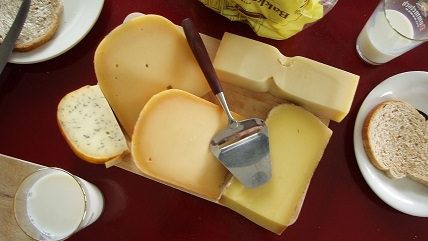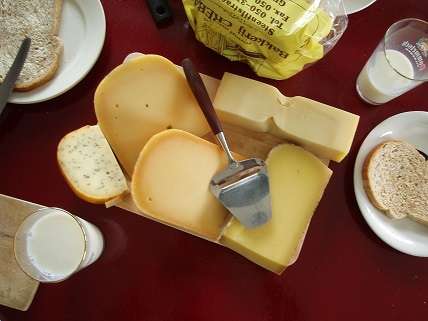The FDA's Unpalatable Cheese Crackdown
Did the FDA really back down? There are holes in that argument.


Last summer, I warned that the Food and Drug Administration could move to "increase restrictions on artisanal cheeses."
My worst fears were realized this week when a nationwide firestorm erupted over an FDA decision to ban the use of wooden planks to age cheese. Cheesemakers, farmers, chefs, commentators, and consumers were furious. The decision to ban the centuries–old practice, first reported by the Cheese Underground blog, seemed to come out of the blue.
"The FDA's decision will not only harm American cheese makers, but may also bring a halt to the importation of artisan cheeses from abroad as Canadian and European Union regulators have not imposed such draconian measures and still allow for the use of wood boards to age cheese," wrote Greg McNeal at Forbes.
"I wouldn't even know what the selection would be like after this as there are so many small run cheese made in this way," wrote Adam Ratmoko, chef at Meritage in Philadelphia, in a Twitter message to me. Ratmoko, whose kitchen serves 18 different types of cheese, was the first of many people to alert me to the FDA's actions last week.
But then the agency reversed course, and the new rule vanished as quickly as it had appeared. The FDA issued an update that began with the sentence, "Recently, you may have heard some concerns…"
No kidding.
What saved cheese? As Walter Olson notes at Overlawyered, the FDA likely spared the substance (for now) thanks to the fact that cheese is a favorite of people who write columns defending their own highfalutin food choices.
The FDA's statement goes on to claim adamantly and definitively that agency bureaucrats "have not and are not prohibiting or banning the long–standing practice of using wood shelving in artisanal cheese."
It notes that a letter the FDA sent to the New York State Department of Agriculture earlier this year was to blame. "[The] language used in this communication may have appeared more definitive than it should have, in light of the agency's actual practices on this issue," said the statement.
So all of this public concern about a potential ban on artisanal cheesemaking is really just much ado about nothing? The FDA backed down, right?
No, and no.
The agency's statement also says that the FDA "will engage with the artisanal cheesemaking community" based on FDA's historic concerns "about whether wood meets [agency food safety] requirement[s.]" It will also "invite stakeholders to share any data or evidence they have gathered related to safety and the use of wood surfaces."
Parsing this language is almost unnecessary. The FDA still wants to ban the use of wooden crates in cheesemaking.
When the FDA "invites stakeholders" to "engage" with its bureaucrats, only bad things happen. When those stakeholders lack a powerful lobby in Washington, D.C., it's time to expect the worst.
The recent FDA chronology bears this out. Recall that the FDA invited the makers of Four Loko and other beers that contained added caffeine to talk with the agency. This period of engagement between Four Loko "stakeholders" and the FDA ended with the agency banning the product.
As I've noted many times, the Food Safety Modernization Act caused outrage among small farmers, food entrepreneurs, and their supporters around the country when it became clear the rules the FDA had invented to enforce the new law would ban many forms of organic farming and bankrupt many small farms.
Passage of the FSMA was followed by an agency investigation (still ongoing) into "any and all products with added caffeine." Then came the FDA's ongoing plan to ban trans fats. That was followed by the agency's idiotic fight to ban the centuries old practice of using spent grains from the brewing process to feed livestock. Now the regulators are coming for cheese.
If you're not seeing the pattern, then there's really nothing I can do. The FDA is a powerful and power–mad agency that regulates 80 percent of the food supply (and growing). The food and beverages you eat and drink today are only legal because the agency hasn't yet figured out a way to ban them.
You dine at the pleasure of the FDA. Enjoy it while it lasts.
